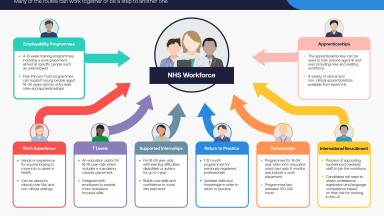Recruiting from your local community
The NHS plays a key role in supporting local communities beyond the provision of health care. As an ‘anchor’ it is often the largest employer of local people and can have a positive impact on their health and wellbeing by offering routes into employment, good work and career development opportunities. The diversity of your community can also provide you with a potential talent pool of candidates who may be underrepresented in your current workforce.
Individual employers and ICSs across the country are working with local partners to make a difference to their communities through employment, using the policy levers and training routes available. It is also important to consider UK labour market trends.
East Lancashire Hospitals NHS Trust partnered with The Prince’s Trust to support young people like Thomas into work. This has transformed his life and he shares his powerful story in this video.
This page brings together useful information and good practice to support your local recruitment and employment strategies and highlights four key areas for employers to consider:
- Routes into employment: different options to support local people to access good work.
- Inclusive recruitment practices: information to help you review or develop local approaches.
- Targeted recruitment: examples of organisations working with local partners to recruit various community groups.
- Career pathways: options for new and existing staff to develop sustainable careers.
Routes into employment
Inclusive recruitment practices
Targeted recruitment
Career pathways
Other resources
- Inclusive recruitment report – case studies from a range of public, private and voluntary sector organisations to support employers to embed inclusive recruitment.
- Health Education England’s national Talent for Care programme includes apprenticeships and work experience/pre employment activity.
- Interactive Career Route Map developed by The Health Estates and Facilities Management Association and The Institute of Healthcare Engineering and Estate Management raises awareness about roles in estates and facilities and the career opportunities that the NHS can offer.
Alignment to national policy
The strategic context for this work is outlined within:
- The NHS Long Term Plan sets out commitments in preventing illness, tackling health inequalities and poverty and supporting social goals including work and health and enhancing the role of the NHS as an anchor.
- The NHS People Plan recognises the role of NHS organisations and large social care employers as anchor institutions to bring those furthest from employment into meaningful employment and to target recruitment, volunteering and apprenticeship opportunities in areas of greater deprivation. It also contains several actions to grow and diversify the workforce, to ensure the NHS people promise is delivered.
- The integration white paper covers workforce, ICSs will be required to support joint health and care workforce planning at place level, working with both national and local organisations.
- The Operational Planning Guidance 22-23 sets out key priorities with a focus on systems working to make the NHS a better place to work, including improving the black, Asian and minority ethnic disparity ratio. ICSs should also use data to redesign care pathways and measure outcomes with a focus on improving access and health equity for underserved communities.
- Core20PLUS5 is a national NHS England and NHS Improvement approach to support the reduction of health inequalities at both national and system level.
- The levelling up white paper, published on 2 February 2022, recognises the links between people’s health, education, skills and employment prospects and focuses on policies that can ensure that everyone, wherever they live, has the opportunity to live fulfilling, healthy and productive lives.














